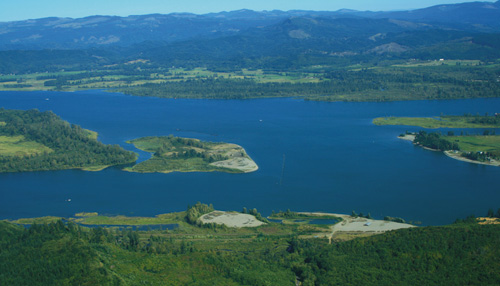 A scaled-down plan for importing liquefied natural gas at Bradwood Landing is quietly working its way through the regulatory system after the failure of a proposed $650 million LNG project at the same location.
A scaled-down plan for importing liquefied natural gas at Bradwood Landing is quietly working its way through the regulatory system after the failure of a proposed $650 million LNG project at the same location.
By Ben Jacklet
 |
Bradwood Landing is again the site of an LNG development plan. The sandy island in the center is Tenasillahe Island, a U.S. National Wildlife Refuge. On the right is Puget Island, Wash. |
A scaled-down plan for importing liquefied natural gas at Bradwood Landing is quietly working its way through the regulatory system after the failure of a proposed $650 million LNG project at the same location.
Seaside-based consultant John Dunzer is proposing importing LNG from Alaska at less than half the volume of the original plan and establishing biomass and manufacturing facilities to create hundreds of local jobs. Under his plan for an “alternative energy farm,” endorsed by the Port of Astoria in June, gas would come in liquid form, be heated into gas with biomass energy and manufactured into liquid oxygen, nitrogen and possibly hydrogen, with the remaining fuel piped to power local mills and power plants.
“All of this has been done before,” says Dunzer, 74. “I’m not trying to invent anything here. I’m just trying to put a few things together and create 700 jobs.”
Dunzer includes jobs in Alaska in his total, as well as several hundred construction and manufacturing jobs in Clatsop County.
Five years of fierce opposition from community members and environmental groups sank the previous attempt to develop LNG terminals at Bradwood Landing. The company behind that proposal, NorthernStar, filed for bankruptcy in 2010. Dunzer’s proposal would be far smaller, eliminating the need to gain permits for dredging. But the ships bringing in the fuel would not exactly be small, at 642 feet. And the plan would require a new pipeline.
Dunzer says he scaled down the project to “go around the local people” and “avoid public hearings.” Not surprisingly, opponents aren’t particularly happy with that strategy. “We really don’t think this is a legitimate project,” says Dan Serres, conservation director for Columbia Riverkeeper, a nonprofit that has battled previous LNG efforts.


